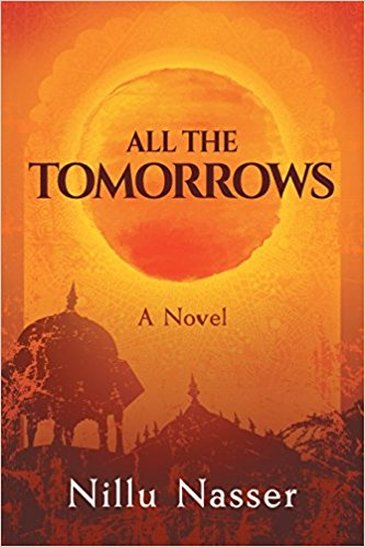 “All the Tomorrows” is a lovely dive into a culture I am unfamiliar with outside of popular movies and music. Nasser brings the reader immediately into an authentic portrayal of India with its buzzing streets, fragrant foods, beautiful clothing, and traditional Indian family values such as arranged marriages and daughters caring for their parents if they are unwed. You have to be willing to accept those cultural differences or Jaya’s subservient behavior to her cruel mother will immediately anger you and make it hard to continue on. But that’s also what makes this book important: to see and be exposed to a real look at a different culture, not one that selectively shows you the good and fun bits like the Holi Festival. I really appreciated that in Nasser’s book and the author does a lovely job of describing the sights, sounds, and smells of Bombay to where I felt like I was on the streets with Jaya and Akash. I just wished I loved the characters themselves as much as I loved the rest of Nasser’s writing. “All the Tomorrows” is, at its core, a story about how betrayal, regret, and constricting cultural obligations shape Akash and Jaya, and how they learn to move beyond their traumatic pasts in order to forgive and love again. I loved the message Nasser has about the changing roles in India for women and how Jaya struggles with being an abandoned married woman, and what that does to her and forces her to endure. I liked seeing her growth after her encounter with Akash where she impulsively decides to light herself on fire—a practice that isn’t unheard of unfortunately. I also liked parts of Akash’s journey towards redemption, but he was so unlikeable for a big chunk of the book even with the penance he pays by living on the streets that I had little sympathy for him for a vast majority of the novel. That did eventually change, but it kept me from embracing his struggle and path towards forgiveness.
The book primarily takes place twenty-one years after the explosive event at the start of the story. It seemed like a long time for both Akash and Jaya to come to terms with their life, the choices they made, and moving on. Jaya’s struggle made more sense to me as she was left with physical limitations and scars based on her choices. Akash’s less so. There were so many complications thrown in that I had a hard time believing as well, especially as everyone seemed to find each other again all at the same time. It felt too convenient even though I found the new difficulties the characters faced interesting. I just felt like it could have been presented in a way that didn’t feel as contrived to me. Also, the book spends most of its time lamenting the past, showing the characters hurts, their struggles, and the pain they still endure because of the event that tore Jaya and Akash apart over two decades ago. It felt a little drawn out to me, however, I enjoyed Jaya’s emotional journey, especially with how she finally stands up to her mother. But given that the novel spends most of its time dealing with rather sad topics as the characters fight to regain what they lost or felt was beyond their reach forever—like love—I hoped that once things started to turn out for the better that we’d be shown how Jaya and Akash grow to accept their new roles and revel in their new joy. But that’s not what happens. I’ll avoid spoilers but the end felt so sudden given the slow pace of reflection the main characters go through. I wanted to see them interacting and re-learning how to be the people they hid away, but instead it just ends abruptly—and pretty tragically—which left me feeling a bit unsatisfied come the books conclusion. Nasser writes beautifully and she weaves in important and uplifting messages throughout the novel that I thought were perfect for women in today’s society all over the world. One that tradition, culture, being married, or having children doesn’t define your worth to society nor does it have to encompass your whole being to where that’s all you are: a mother, a wife, a daughter. Such a great message and its woven expertly into Jaya and Soraya’s story arc making these two very different women strong warriors in their own way. And again, the descriptions of India were lovely! I just wish that Akash had been a stronger character, the organization of the major life events organized differently, and more time spent on the redemption side of the relationship rather than the abrupt and violent ending we’re presented with. Still, the author is extremely talented and I enjoyed most of the book so this is a 3.5 star for me. And thanks to the author for providing a review copy!
0 Comments
Leave a Reply. |
Click the book images to see them on Amazon!
Categories
All
|






 RSS Feed
RSS Feed



















